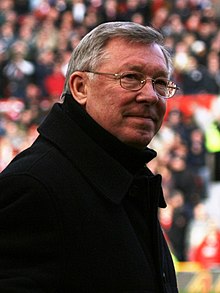This is an old revision of this page, as edited by Firefiend (talk | contribs) at 19:26, 28 April 2014 (Undid revision 606046931 by 99.224.51.134 (talk) this was meant to draw a distinction between US sports and European sports). The present address (URL) is a permanent link to this revision, which may differ significantly from the current revision.
Revision as of 19:26, 28 April 2014 by Firefiend (talk | contribs) (Undid revision 606046931 by 99.224.51.134 (talk) this was meant to draw a distinction between US sports and European sports)(diff) ← Previous revision | Latest revision (diff) | Newer revision → (diff) This article is about real life association football managers. For the video game, see Football Manager.| This article needs additional citations for verification. Please help improve this article by adding citations to reliable sources. Unsourced material may be challenged and removed. Find sources: "Manager" association football – news · newspapers · books · scholar · JSTOR (July 2013) (Learn how and when to remove this message) |

In association football, a manager or coach is responsible for selecting players and coaching a football club or a national team. The term "manager" is often used for such a position in a professional club reporting directly to the club chairman, while "coach" has is often used for heading a national team.
Responsibilities
The manager's responsibilities in a professional football club usually include (but are not limited to) the following:
- Selecting the team of players for matches, and their formation.
- Planning the strategy, and instructing the same on the pitch.
- Motivating players before and during a match.
- Delegating duties to the first team coach and the coaching and medical staff.
- Scouting for young but talented players for eventual training in the youth academy or the reserves, and encouraging their development and improvement.
- Buying and selling players in the transfer market, including loans.
- Facing the media in pre-match and post-match interviews.
Some of the above responsibilities are shared with the director of football or sporting director, and are at times delegated to an assistant manager or club coach.
Additionally, depending on the club, some minor responsibilities include:
- Marketing the club, most especially for ticket admission, sponsorship and merchandising.
- Growing turnover and keeping the club profitable.
These responsibilities are more common among managers of small clubs.
The wishes of a national team manager may sometimes conflict with those of a club manager over selection of club players for the national squad; the club manager may not wish the player to miss domestic fixtures. For this reason, in many cases, national football team managers are selected from current club team managers and also in many cases, they select the players of their clubs.
European manager or coach
The title of "manager" is almost exclusively used in British football. In the majority of countries where professional football is played, the person responsible for the direction of a team is awarded the position of coach or "trainer". For instance, despite the general equivalence in responsibilities, Fabio Capello was referred to as the manager of England, while Joachim Löw was described as the head coach of Germany (Germany also has a team manager role that is subordinate to the head coach and that is filled by Oliver Bierhoff). For 1994-96 including Euro 96, however, The Football Association struggled to identify an alternative candidate to Terry Venables, so their discomfort with his soiled reputation for probity was articulated in their appointment of him as England 'coach' rather than under the traditional title of 'manager'.
North American equivalent
The responsibilities of a European football manager or (head) coach tend to be divided up in North American professional sports, where the teams usually have a separate general manager and head coach (known as a field manager in baseball).
The American-style general manager and head coach have clearly distinct areas of responsibilities, and in most cases the general manager outranks the head coach. For example, a typical European football manager would have the ultimate authority on in-game decisions (including player line-ups and tactics), and off-the-field and roster management decisions (including contract negotiations), even when their team also has a first team coach and/or sporting director whom some duties are delegated to. In American sports, these duties would be handled separately by the head coach and general manager, respectively.
Occasionally a person may fill both these roles, such as Pat Quinn who was general manager and head coach of the Vancouver Canucks and later the Toronto Maple Leafs, and Bill Belichick of the New England Patriots who the team's head coach and has the final say on football matters (having authority over the general manager, although that post is held by someone else).
See also
- Caretaker manager
- Player-manager
- League Managers Association for managers in England
- List of managers and coaches who have qualified for the UEFA Pro Licence
References
- "Manager or Coach?". Football Italia. 2008-09-05. Retrieved 2011-01-30.